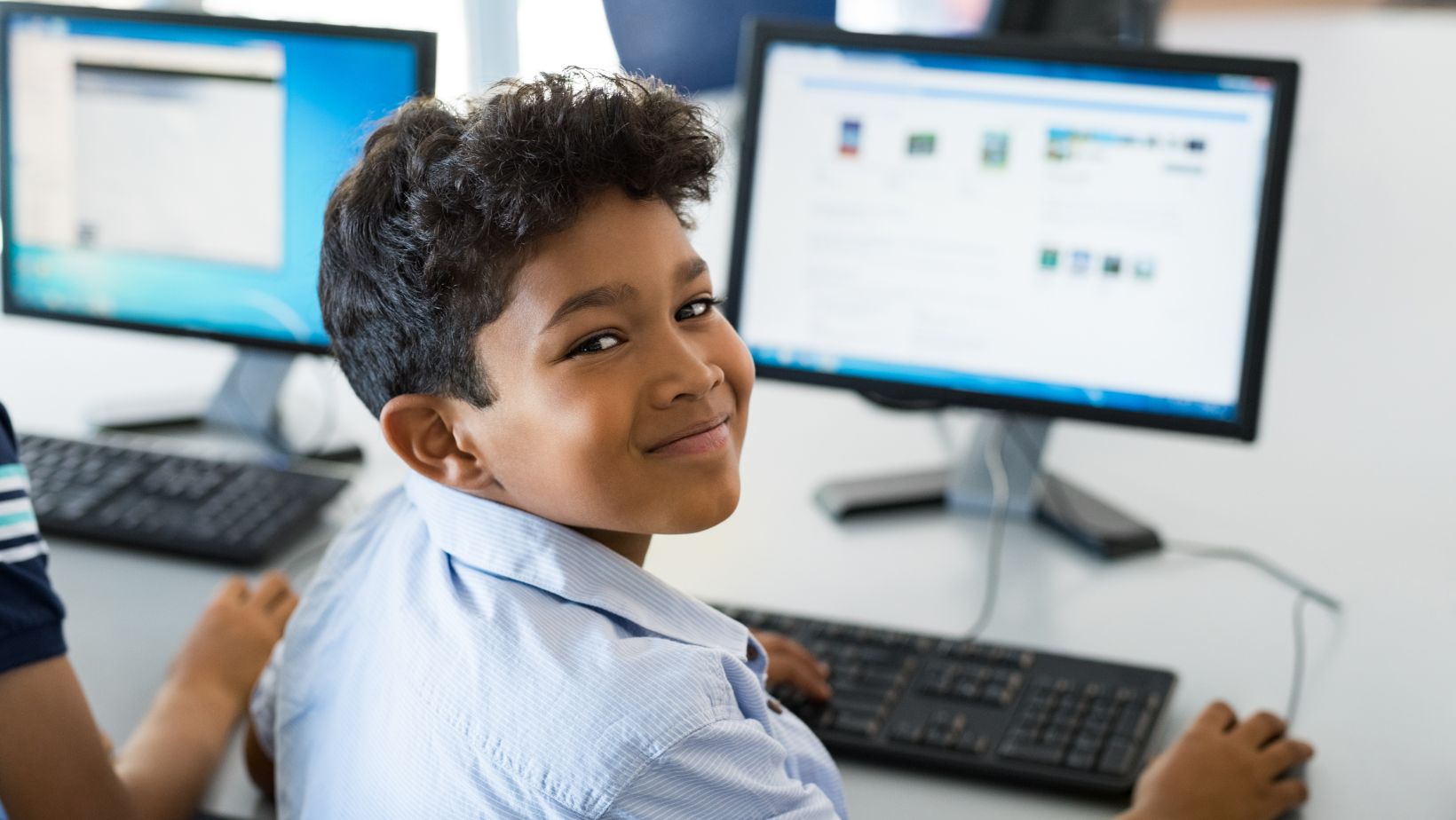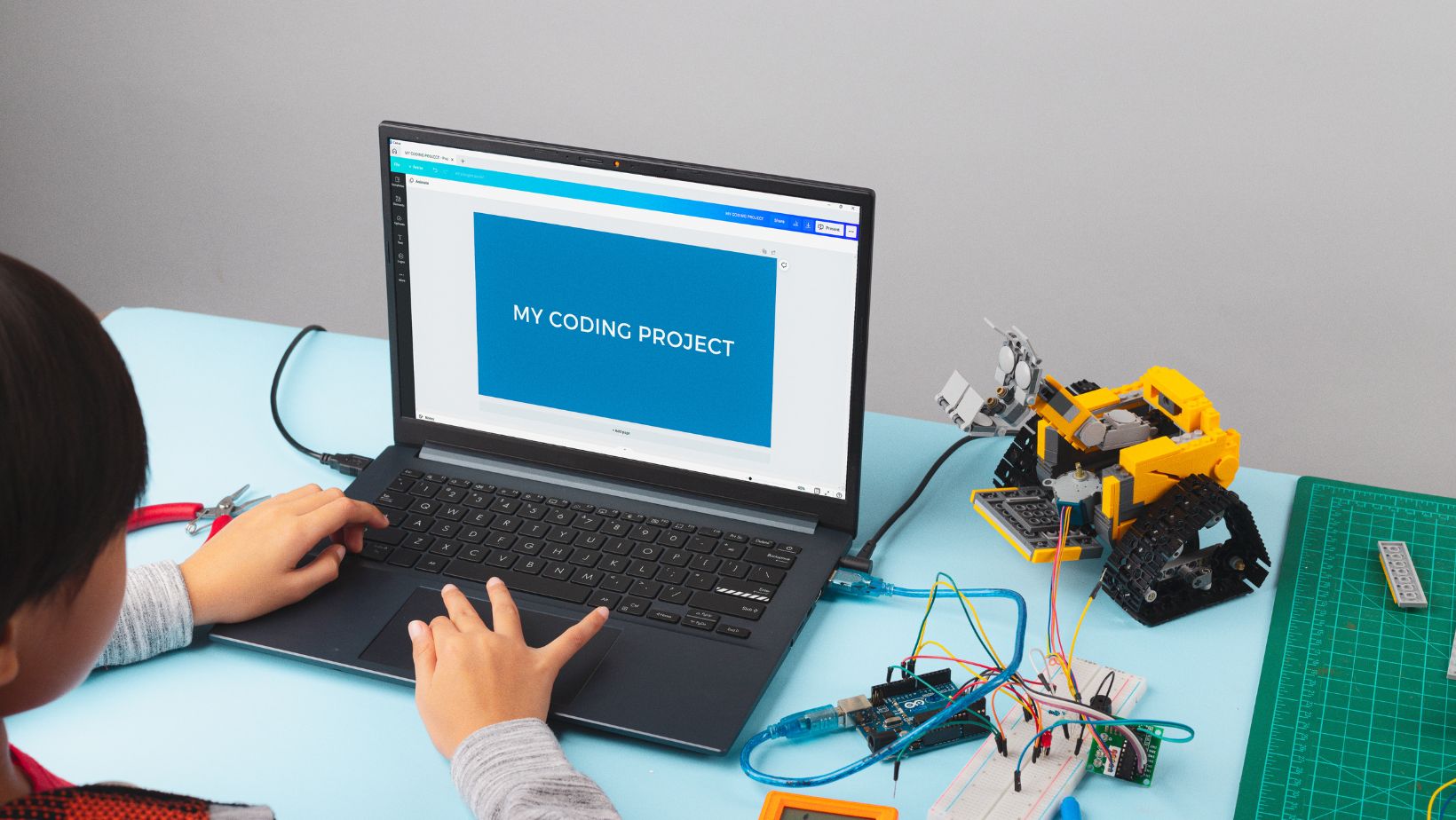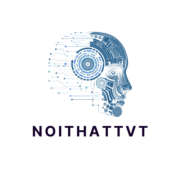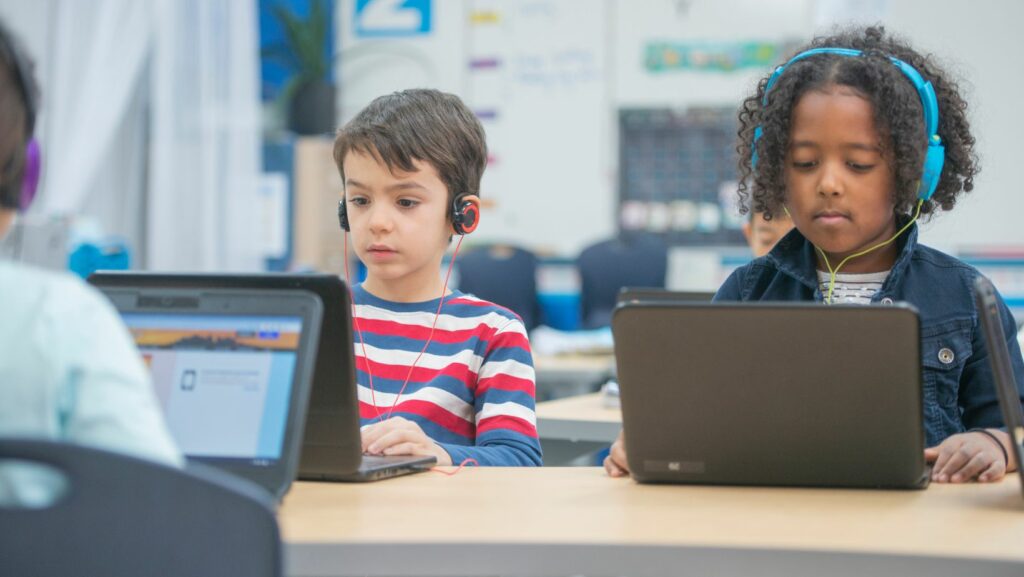Key Takeaways
- Importance of Early Computer Exposure: Introducing computers to children enhances curiosity and educational experiences, preparing them for a tech-driven future.
- Age Appropriateness: Different types of computers, such as tablets for ages 3-5, laptops for ages 6-8, and all-in-ones for ages 9-12, cater to various developmental stages and learning needs.
- Key Features to Consider: When selecting a computer, prioritize user-friendly interfaces, educational software, interactive games, parental controls, and durability to ensure a safe and productive learning environment.
- Variety of Device Options: Popular choices for kids include Chromebooks, Apple iPads, and Windows laptops, each offering unique functionalities tailored for educational growth.
- Critical Skill Development: Using computers helps develop critical thinking, problem-solving abilities, and digital literacy, essential skills for future success.
- Safety Features: Effective parental controls and durable designs play a vital role in protecting children online and ensuring longevity of the devices.
In today’s digital age, computers have become essential tools for learning and creativity, especially for kids. With technology shaping the future, introducing children to computers can ignite their curiosity and enhance their educational experience. From coding basics to engaging games, the right computer can open doors to a world of possibilities.
Parents often find themselves navigating a sea of options when choosing the best computer for their child. Factors like age, educational needs, and safety features play a crucial role in making the right choice. Understanding these elements can empower parents to select a device that not only entertains but also educates, setting the stage for a bright future in an increasingly tech-driven society.
Computers For Kids
Computers designed for kids combine learning and enjoyment, enhancing their educational journey. Various types of devices, such as laptops, tablets, and desktops, cater to different age groups and purposes. Each type offers unique features that support children’s creativity and learning.
Key Features
- User-Friendly Interface: Many computers for kids include intuitive designs that simplify navigation.
- Educational Software: Programs focused on subjects like math, science, and languages promote skill development.
- Interactive Games: Engaging games enhance problem-solving abilities while making learning fun.
- Parental Controls: Robust security features ensure kids browse safely, allowing parents to monitor usage.
- Durability: Devices often incorporate sturdy materials to withstand rough handling by younger users.
Recommended Age Groups
- Ages 3-5: Tablets with educational apps introduce basic concepts in engaging formats.
- Ages 6-8: Kid-friendly laptops promote early coding skills through interactive games.
- Ages 9-12: More advanced computers provide opportunities for creative projects and homework assistance.
- Chromebooks: Affordable and versatile, suitable for internet-based learning.
- Apple iPads: Known for educational apps and a vast ecosystem that supports creativity.
- Windows Laptops: Offer broad functionality, from gaming to complex software use.
Computers for kids play a crucial role in fostering digital literacy. Selecting the right device hinges on understanding the child’s needs, interests, and safety considerations.
Benefits Of Computers For Kids
 Computers offer significant advantages in a child’s education and development. By integrating technology into learning, children gain access to a wide array of resources and skills necessary for their future.
Computers offer significant advantages in a child’s education and development. By integrating technology into learning, children gain access to a wide array of resources and skills necessary for their future.
Enhanced Learning Opportunities
Computers provide children with interactive tools that facilitate learning. Educational software, online courses, and engaging games promote active participation. For example, programs like Khan Academy and Duolingo cater to various subjects and ages, enhancing understanding and retention. Children can explore subjects beyond the classroom with access to virtual museums, science simulations, and coding tutorials. Furthermore, collaborative projects utilizing cloud-based tools enable teamwork and communication, essential in today’s educational landscape.
Development Of Critical Skills
Computers help nurture critical thinking, problem-solving, and digital literacy skills. Engaging in coding and programming introduces logical reasoning and creativity. Participating in online discussions fosters articulation and social skills. Moreover, navigating different interfaces and tools builds adaptability and resourcefulness. For instance, using spreadsheet software enhances quantitative skills and data analysis. As children interact with technology, they develop a foundational understanding of digital privacy and safety, preparing them for responsible online behavior.
Types Of Computers For Kids
Various computers designed for kids offer unique features that cater to different age groups and learning needs. These include tablets, laptops, and all-in-one computers, each supporting educational growth.
Tablets
Tablets serve as versatile devices, ideal for younger children aged 3-5. Their touchscreens enable intuitive interaction, making learning engaging. Tablets often come preloaded with educational apps and games that promote reading, math, and language skills. Options like the Apple iPad or Amazon Fire Kids Edition provide parental controls, ensuring a safe online environment. Lightweight and portable, they encourage exploration while providing access to vast resources.
Laptops
Laptops are suitable for children aged 6-8 and beyond. Featuring physical keyboards, they support typing skills essential for academic work. Kid-friendly models, such as Chromebooks, often include educational software that assists in subjects like coding and creative writing. Many laptops offer durability and built-in safety features, which protect against inappropriate content. With portability and performance suited for schoolwork and creative projects, laptops serve as a valuable tool for developing digital literacy.
All-In-One Computers
All-in-one computers cater to older children, typically ages 9-12. These devices combine powerful hardware with large screens, enhancing usability for tasks like graphic design or programming. They host extensive storage and processing capabilities, accommodating more complex software. All-in-one computers often offer robust parental controls, allowing guardians to monitor usage effectively. With a desktop-like experience, they provide an immersive platform for both learning and entertainment, preparing children for future academic challenges.
Features To Consider
Selecting the right computer for kids involves understanding specific features that enhance safety, usability, and longevity. Key considerations include durability, parental controls, and user-friendly interfaces.
Durability
Durability remains a crucial factor when choosing computers for children. Devices designed for kids often feature sturdy constructions, reinforced frames, and shatter-resistant screens. For instance, laptops like the ASUS Chromebook Flip and Lenovo 100e withstand accidental drops and spills. These robust materials ensure devices endure everyday wear and tear, accommodating active use.
Parental Controls
Parental controls provide an extra layer of safety for children’s online activities. Effective tools allow parents to set usage limits, filter content, and monitor online interactions. For example, devices such as the Amazon Fire Kids Edition incorporate comprehensive parental control settings, enabling parents to customize their child’s digital experience. Strong parental controls promote a safer internet environment while encouraging responsible tech habits.
User-Friendly Interfaces
User-friendly interfaces make computing accessible for children. Intuitive designs, simple navigation, and touchscreens cater to various age groups, ensuring kids can easily interact with technology. Options like the Apple iPad present straightforward layouts, while Chromebooks utilize Google’s simple structure that supports educational apps and games. User-friendly features empower kids to explore learning opportunities independently and confidently.
Best Computers For Kids In 2023

Selecting the right computer for kids involves recognizing their needs and interests. The following categories showcase the best options available in 2023.
Top Picks
- Apple iPad (9th Generation)
Apple iPad features a 10.2-inch display, an A13 Bionic chip, and access to a vast library of educational apps. Its durable design and parental controls facilitate safe use.
- Lenovo Chromebook Duet
Lenovo Chromebook Duet includes a detachable keyboard, transforming from a tablet to a laptop. It offers a lightweight design, responsive display, and seamless access to Google Workspace.
- Acer Aspire 5
Acer Aspire 5 hosts an AMD Ryzen processor, a 15.6-inch HD display, and adequate storage for educational software. Its versatility serves children from middle school to high school.
- ASUS Chromebook Flip C214
ASUS Chromebook Flip C214 combines a rugged design with a 360-degree hinge. Its durable build suits frequent handling while including a sunlight-readable display for outdoor use.
- Raspberry Pi 400
Raspberry Pi 400 provides a budget-friendly, programmable option for older children. Its built-in keyboard and ability to learn coding via various projects encourage creativity and technical skills.
- Amazon Fire HD 10 Kids Edition
Amazon Fire HD 10 Kids Edition includes a 10.1-inch display, robust parental controls, and a year of Amazon Kids+ content. It offers excellent value for young children.
- Lenovo Chromebook 100e
Lenovo Chromebook 100e features a 11.6-inch display and a spill-resistant keyboard. This affordable option caters to younger users while supporting essential educational applications.
- HP Chromebook 14
HP Chromebook 14 hosts a larger 14-inch screen and sufficient performance for pricing-conscious families. Its battery life and solid construction ensure reliability for everyday tasks.
- Samsung Galaxy Tab A Kids Edition
Samsung Galaxy Tab A Kids Edition combines a kid-friendly interface with a durable, protective case. Access to preloaded educational materials provides valuable learning opportunities.
- Dell Inspiron 11 3000 Series
Dell Inspiron 11 is equipped with an 11.6-inch display and access to Windows applications. Its affordability and lightweight design make it ideal for younger students.
Kids on Computer
Selecting the right computer for kids is a vital step in nurturing their educational journey. With the right device, children can explore their creativity and enhance their learning experiences. By considering factors like age, safety features, and educational needs, parents can make informed decisions that align with their child’s interests.
The variety of options available ensures there’s something for every age group and purpose. Whether it’s a tablet for younger kids or a more advanced laptop for older students, each device offers unique benefits. Investing in quality technology not only supports academic growth but also prepares children for a tech-savvy world. Embracing this digital age can lead to a brighter future for the next generation.

